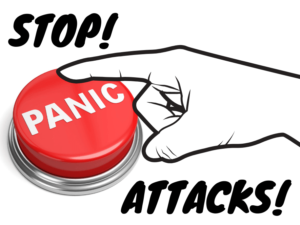Panic attacks
Panic attacks are quick, out of the blue times of extreme fear or worry that can be too much to handle. There can be no warning signs before a panic attack. These symptoms usually peak in a matter of minutes and might include a wide spectrum of upsetting physical and emotional expressions. Some of the most common signs of a panic attack are a fast heartbeat, chest pain, shortness of breath, shaking or trembling, lightheadedness, perspiration, chills or hot flashes, a sense of helplessness, and a loss of control.
Although panic attacks can be quite frightening, it is important to remember that they do not represent a threat to one’s life. Several strategies can help you prevent or control a panic attack, such as the following:
As you practice deep breathing, focus on taking slow, deep breaths. Inhale slowly with your nose as you count to four, and then exhale slowly through your mouth as you count to four. By using this deep breathing technique, you can help control your breathing and lessen physical illnesses.
Use relaxation methods like guided visualization or progressive muscle relaxation. Techniques for relaxation include these methods. You can use these exercises to help you relax your body and mind during a panic attack.
Think positively: Negative or disastrous thoughts can start panic attacks or exacerbate them. It’s critical to question these ideas. Please try to identify these ideas and challenge them. It’s critical to consider whether their statements are supported by evidence or whether there are alternative explanations.
Participating in activities that will assist you in diverting your focus from the panic attack is important. Think about trying to solve a simple problem, listening to relaxing music, or focusing on anything in your immediate surroundings.
Grounding techniques: You should use grounding techniques if you wish to help yourself stay present in the moment. Attempting to identify and describe the objects in your immediate surroundings that you can see, hear, smell, taste, and touch is one example.
Seek Support: If you feel comfortable doing so, ask a family member, close friend, or mental health professional for help and assurance when you are having a panic attack.
Take Care of Yourself: Prioritize your well-being and engage in activities that will help you unwind and feel better about yourself. This can include getting enough sleep, eating a healthy diet, exercising frequently, and using stress-reduction techniques like yoga or meditation.
However, for a thorough assessment and further guidance, it is advised that you consult a mental health professional if you experience panic attacks frequently or if they significantly impact your daily life. It is important to emphasize that these strategies can help in panic attack management. They can offer tailored strategies and offer recommendations for other therapies, including counseling or medication, if necessary.
How Hypnosis Can Help Prevent Panic Attacks
How Hypnosis Supports Anxiety Management
Are panic attacks interfering with your daily life and goals? Do you find yourself worried about when the next one might strike?
Panic attacks vary from person to person, but some common symptoms include:
- Quick, shallow breathing
- Upset or churning stomach
- Feeling lightheaded
- Flashes of hot or cold
- Pounding heart
- Trembling or tingling sensations
No matter how they show up, panic attacks can feel overwhelming and difficult to handle.
How the Body’s Emergency System Works
When a real emergency arises, your body releases adrenaline to help you respond. While essential for true danger, this powerful response can also activate in non-threatening situations—often during times of high stress or when something reminds you of past trauma.
Why Stress Management Matters
Fortunately, there are effective ways to lower the chances of a panic attack. Reducing your overall stress is helpful, and you can do this by:
- Eating a healthy, balanced diet
- Staying physically active
- Getting plenty of rest
- Building connections with others
Finding methods to relax is also one of the best ways to manage stress.
How Hypnosis Can Help with Panic Attacks
Hypnosis is a powerful tool for anxiety and panic because it promotes deep relaxation. In this state, you can explore anxiety triggers with a calm, objective mindset, helping retrain your brain to recognize that the situation isn’t truly dangerous.
Introducing the “Stop Panic Attacks” Hypnosis Program
“Stop Panic Attacks” is an audio hypnosis program that helps decrease the frequency of panic attacks while teaching you how to manage them. With repeated listening, you’ll notice:
- You experience deeper relaxation, and your panic attacks become less frequent.
- You bounce back quickly from panic and can access calm whenever needed.
Take control of your inner peace with “Stop Panic Attacks.” Once you purchase, you can listen to the program on your computer or mobile device.
How Hypnosis can be so effective for anxiety-based conditions
